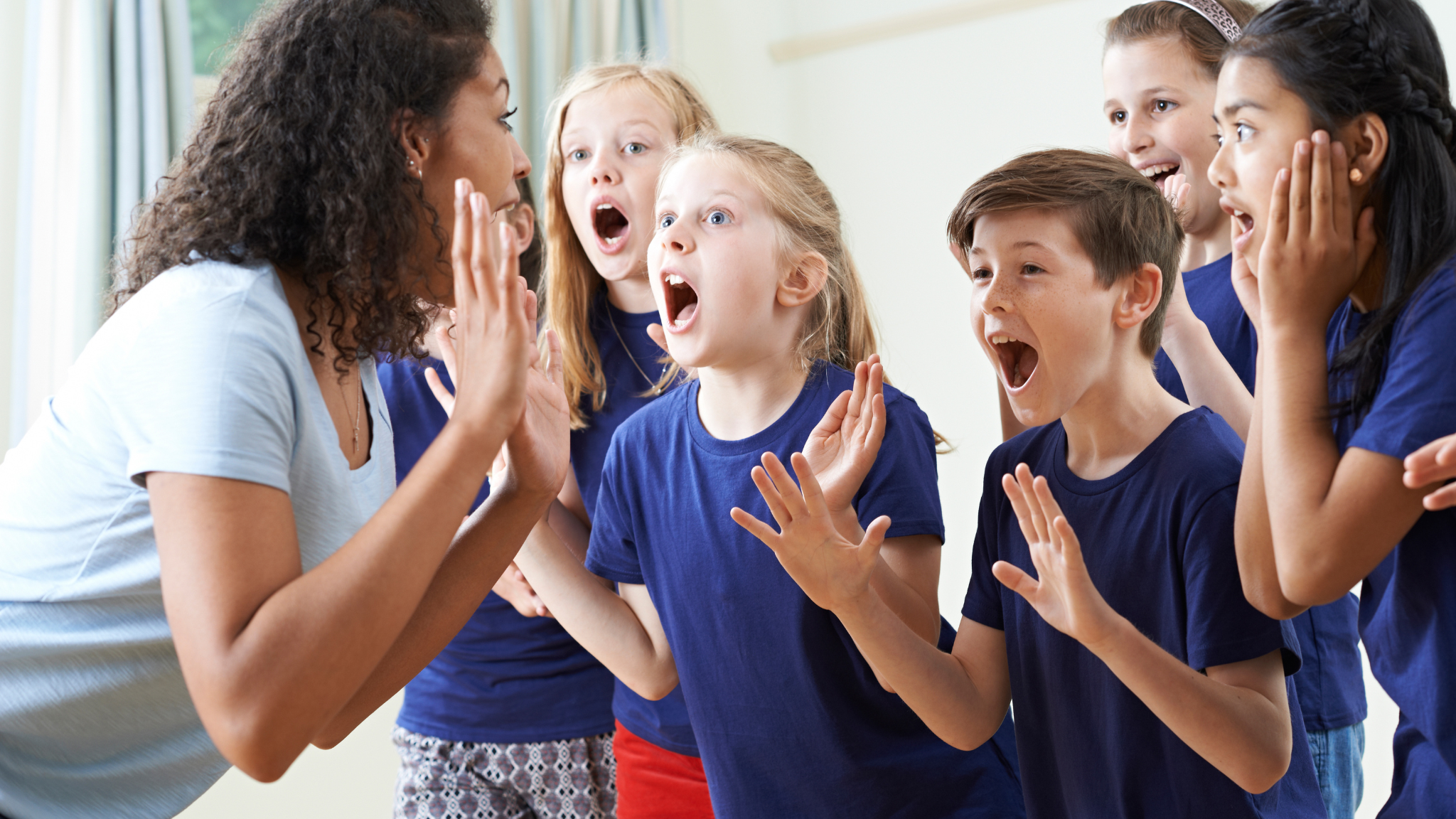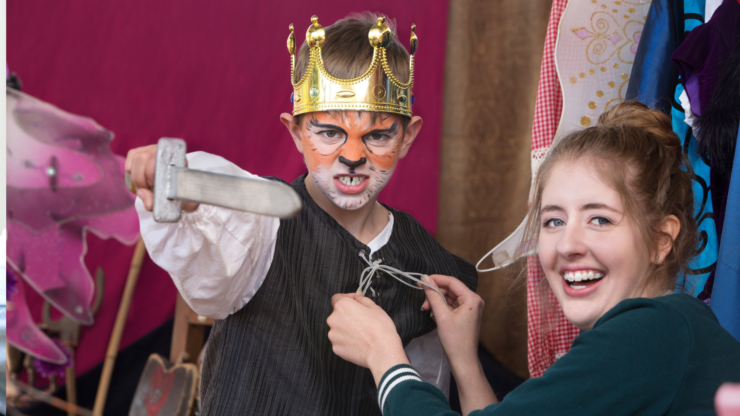Acting is not just about memorizing lines and being an annoying theater kid. (Shout out to all the annoying theater kids out there!) Even if a child has no desire to become a professional actor someday, acting can benefit them in many ways.
In an interview with Newsweek to promote Weird: The Al Yankovic Story, actor Evan Rachel Wood discussed the benefits of acting for kids, saying, “Yeah, I think children acting is great because I think acting as an art form and as a form of expression and doing that, especially when you’re young, it taught me so much about myself and other and empathy and being present.”
Wood began acting when she was just 7 years old! Although she fully supports kids acting for fun, she is strongly against kids having careers.
I loved acting as a kid and even wanted to become a child actor. Even though I never ended up getting my big break in Hollywood, I still received positive outcomes from acting on stage and taking acting courses throughout my life. I have also seen how dramatic play has helped my students of all ages.
Here are 7 reasons why acting is awesome for kids!
1) Boosts a Child’s Confidence
Confidence is the key to doing anything successfully in life. Whether your child ends up being a doctor, entrepreneur, or TikToker, they’ll need confidence.
Acting helps kids step outside of their comfort zone and discover new things about themselves. When a kid performs in front of others, whether it’s in a classroom or on stage, they’re overcoming any fears they might have of speaking in public and being the center of attention. They can express themselves in ways they might have been too scared to before, but because they are playing another person, it’s more fun and easier to express who they truly are in front of an audience.
2) Teaches Social Skills
Social media is making kids less social because of how it glues kids to a screen and makes them look for likes and follows instead of real human interactions. Acting is the perfect screen-free activity and a great way for your child to make new friends.
If your child joins a drama class at school, they will bond with the other kids in their class since they will be partnering up and working in groups to work on different acting exercises.
Actors in a play typically become close friends because they have to rehearse a lot together and they end up seeing each other in vulnerable states throughout the rehearsal and performance process.
Actors need to trust the people they’re acting with and play off of their energy and emotions in order for their characters to react realistically. This creates a strong friendship among actors who work together. You see it all the time with big Hollywood celebs like Zendaya and Hunter Schafer who became BFFs after working on Euphoria together, or Kate Winslet and Leonardo DiCaprio who became close friends after co-starring in Titanic.
3) Improves Emotional Intelligence
Acting helps kids become more aware of their emotions and feel stronger empathy for others. They literally have to put themselves in someone else’s shoes and find similarities between themselves and their character in order to portray that character in a believable way.
Kids who act become more in tune with their feelings and are better at reading people and understanding how to read someone’s body language and tone to better understand them and where they are coming from.
Acting can also be therapeutic because it allows kids to experience and express frustration, sadness, fear, anger, and other negative emotions in a fun and safe environment.
4) Enhances Problem-Solving Skills
One of the most important skills needed in acting is problem-solving. When you first get your script, scene, or dramatic exercise, the first thing you need to do is figure out how to interpret the script and then figure out how you will play that character.
In a stage production, there are so many problems that need to be solved: What costume am I going to wear? Where am I going to stand? How do I say this line? Acting helps kids think on their feet and meet challenges head-on. They can use this valuable skill in every aspect of their life.

5) Helps Creativity
Creativity is another major skill needed in acting and really, everything else in life. According to Jonathan Schooler, a professor of psychological and brain sciences at the University of California, Santa Barbara, “Creativity is at the core of innovation. We rely on innovation for advancing humanity, as well as for pleasure and entertainment…Creativity underlies so much of what humans value.”
In order to give a more compelling performance, actors need to be creative in how they approach their characters. Think of Joaquin Phoenix in The Joker. So many amazing actors have played the Joker before, but because of his creativity, Joaquin was able to portray the Joker in a completely new and captivating way. Acting will help your child exercise their creative muscle and will give them the confidence to take action on their creative ideas.
6) Boosts Brain Function
Acting improves a child’s memory, focus, and concentration. When a child is memorizing lines, or remembering their blocking and cues, it helps them better retain and recall information.
It can also improve a child’s cognitive flexibility which allows kids to easily jump from one task to another and adapt to different scenarios. Cognitive flexibility helps us solve problems, acquire and integrate new information rapidly, and respond to changing conditions.
7) Improves Communication & Public Speaking Skills
Kids learn how to project their voices and speak clearly when acting. These are essential skills for speaking in public and communicating confidently with others.
Through acting exercises and taking on roles, kids learn the art of verbal and nonverbal communication. They will study dialogue carefully and learn how to break it down to pick up on subtle cues that gives them better insight into what the characters are thinking and feeling.
By being able to better understand non-verbal communication, actors can add more nuance to their characters and give their characters more depth. This will help them when they are communicating with teachers, friends, fellow students, and anyone else they encounter.
Your kid doesn’t need to go to acting school to learn how to act. For younger kids, you can do dramatic play at home using funny hats, glasses, and costumes. You can recreate your child’s favorite stories or make up your own stories. There are also lots of fun dramatic games you can do with your child. Check out this article from Backstage for ideas!
If your pre-teens or teen wants to try acting, they can join the drama club, try out for the school play, or make their own videos where they act out different scenes from books, TV shows, or movies. And of course, they can also write their own scripts too.
You can also see if your local community center, theater, drama school, or film school has workshops and camps for kids. The New York Film Academy offers acting workshops and camps for kids and teens, but you can try to find something close to you if you’re not in NY.
Acting is a great extracurricular activity that can change your child’s life!









Add comment